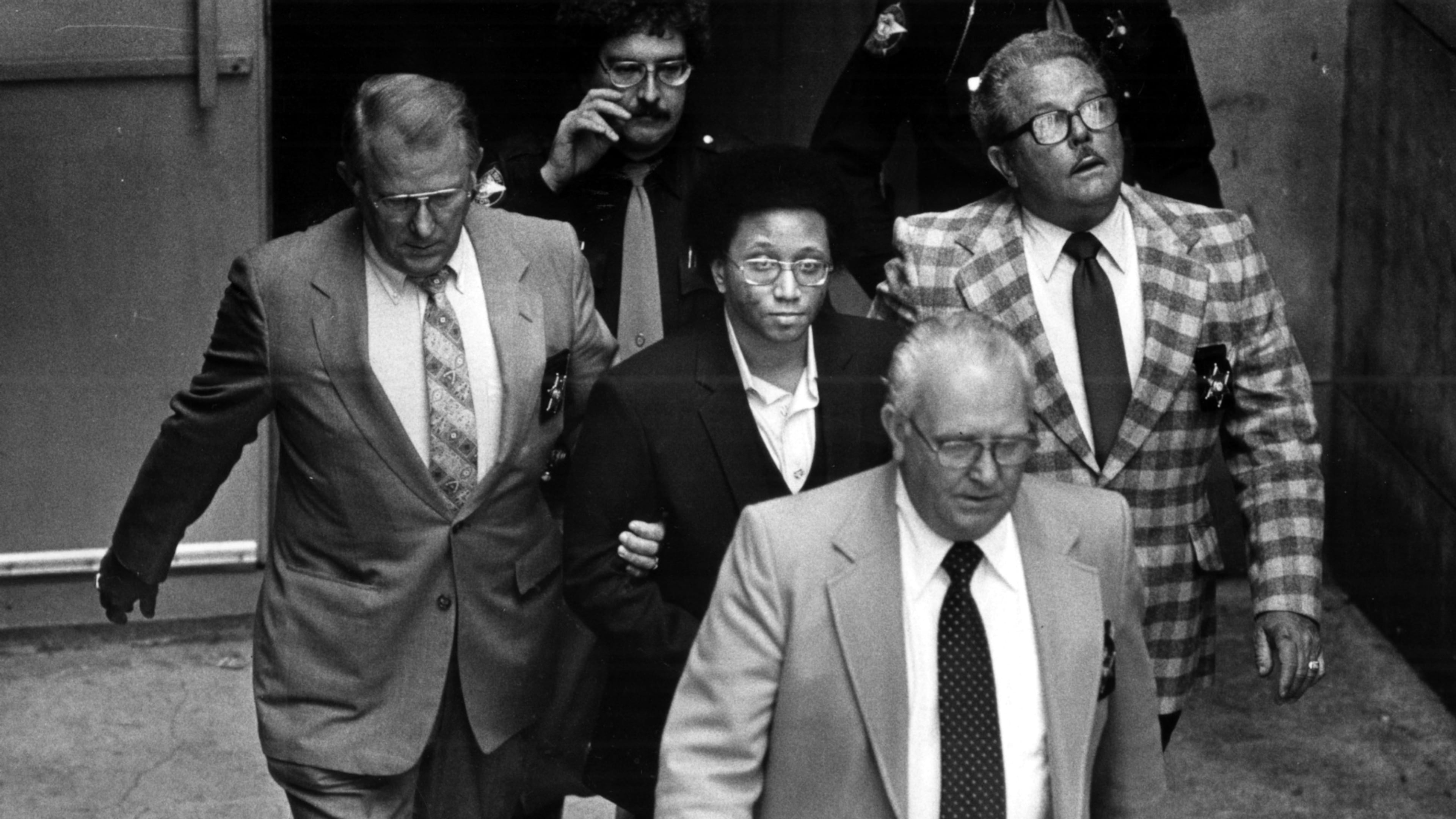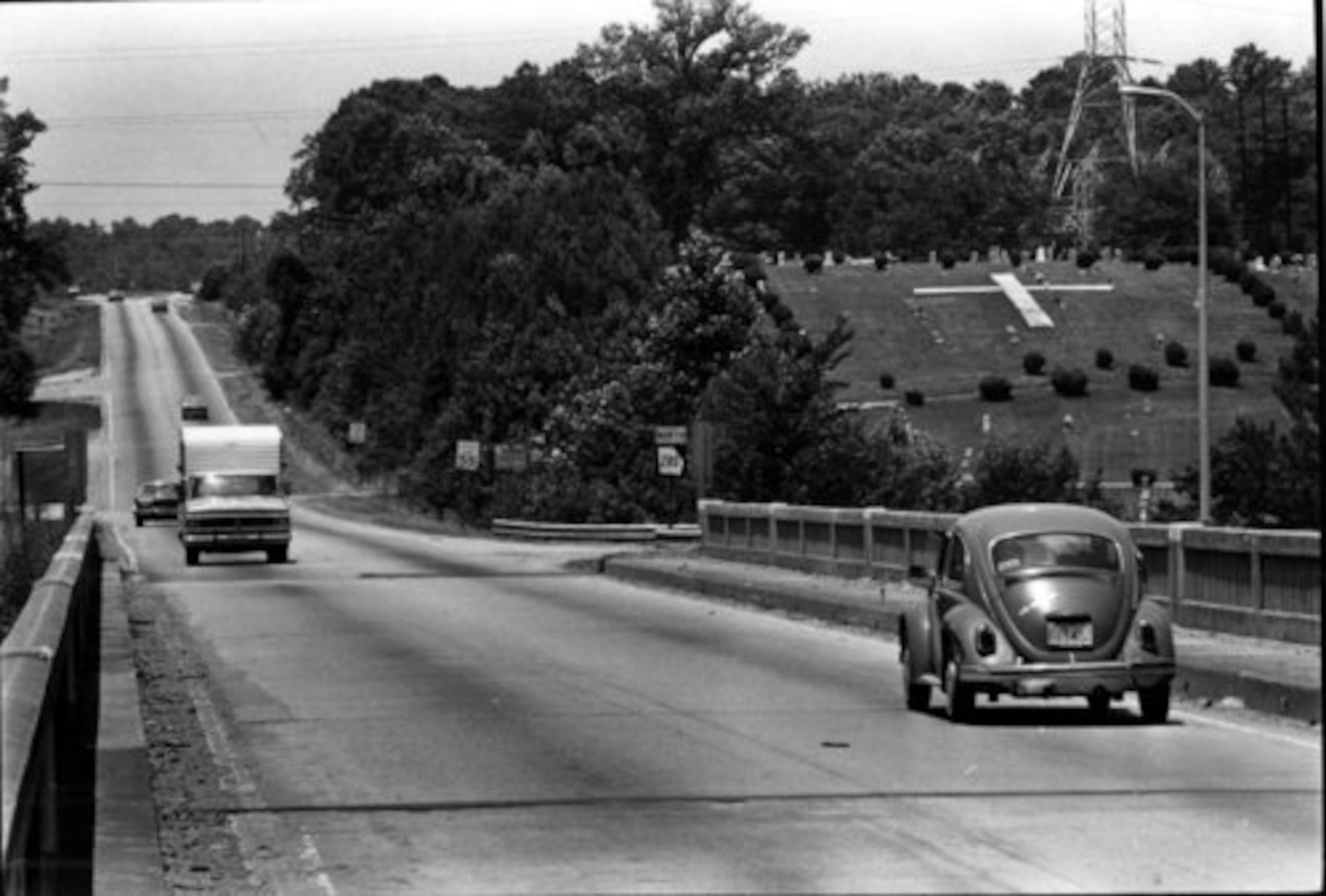
(This story was originally published June 22, 1981 in The Atlanta Constitution.)
Wayne B. Williams, a 23-year-old black freelance cameraman was arrested Sunday afternoon and charged with murder in connection with the slaying of Nathaniel Cater, the latest victim in a string of 28 slayings of young Atlanta blacks.
Atlanta Public Safety Commissioner Lee P. Brown refused to say Sunday evening whether Williams would be charged with any additional slayings.
Williams’ arrest is the first since the slayings of young blacks began nearly 23 months ago. Brown announced the arrest during a brief news conference outside the Fulton County jail about 6 p.m., shortly after Williams was taken into custody.
Authorities said the arrest came after officials received a more conclusive report over the weekend on fibers taken from Williams’ home and from some of the victims. Police also became concerned late Saturday that Williams might flee.
The probable cause for making the arrest was set out in an affidavit which officials declined to release Sunday, but one authority said “there was nothing surprising or new” in that document.
Williams as first questioned on May 22 after police staking out the South Cobb Drive Bridge over the Chattahoochee River heard a splash in the river. Two days later, Cater’s nude body was found in the river in the South Cobb Drive Bridge area.

Williams was again questioned by police for 12 hours on June 3 and June 4 at FBI headquarters and released without being arrested or charged, although police have followed Williams ever since. At a press conference four hours after his release, Williams said his interrogators had told him, “You killed Nathaniel Cater,” and called him a “prime suspect.”
Williams denied any connection with the slayings.
Fulton County District Attorney Lewis Slaton has said in an interview following the discovery of Cater’s body in the Chattahoochee River that Cater’s death probably was related to the 13 most recent cases under investigation by the special police task force. Those slayings began on Oct. 9, 1980, three months after the special police task force was formed to investigate the killings.
“I’m connecting Cater to the other cases …” Slaton said in the interview, “because of the way he was dumped (in the river), the fact he was nude, and the way he was killed (asphyxiation).”
Cater was the sixth victim to be found in the Chattahoochee River. Another three victims have been found in or on the banks of the South River.
Like 16 other victims on the list, Cater had been asphyxiated. Cater, who had not been reported missing, was last seen about wo weeks before his body was discovered.
Cater, who was found nude, was the seventh victim who was missing at least some clothing.
Slaton said at the time that he was not connecting a handful of earlier cases in which crime lab experts found fiber evidence similar to that found on the more recent bodies.

Slaton had no comment Sunday on Williams’ arrest.
Officials said Sunday night that the fiber evidence now appears to be more significant.
Late-breaking lab results on fiber evidence apparently encouraged Slaton to sanction an arrest, officials said Sunday. One official said two forensic scientists brought in by the state crime lab found that a match of fibers found on several victims and in Williams’ home was “99 percent conclusive.”
According to some unconfirmed reports, those experts were Royal Canadian Mounted Police lab technicians and Florida forensic scientists who worked in the investigation of Theodore Bundy, who was convicted of killing two Florida State University coeds.
Williams’ arrest also came on the heels of a police chase Saturday night, in which Williams drove to the homes of Atlanta Mayor Maynard Jackson and Commissioner Brown, causing investigators to worry that Williams was becoming “unpredictable,” and might attempt to elude them, officials indicted Sunday.
Though Williams had visited Brown’s home once before on June 10, Saturday night’s excursion was more threatening to investigators because they felt they were getting closer to an arrest, said one official. “The closer you get to making an arrest, the more careful you’ve got to be about keeping track,” he said.
Meanwhile Sunday night, officials said that the investigation into Williams will continue in an attempt to bolster the case. Officials, including Slaton, have said at various points since Williams’ interview at FBI headquarters that there was not enough evidence to bring a case against the man.
Though additional evidence was received over the weekend, on top official said, “I’m not quite sure no none is convinced that it’s the best case.”
Gordon Miller, a Slaton assistant who has been advising the police investigation said Sunday night,” We’ve got some work to do, but I think we’ve got a good case.”
When he made the announcement of Williams’ arrest Sunday, Brown said, “At approximately 5 p.m. this date, Wayne Williams, black male, 23 years of age, was taken into custody and was charged with criminal homicide of Nathaniel Cater.”
Brown was flanked by the leadership of the task force that has been investigating the slayings since July 1980, Atlanta Police Chief George Napper and Fulton County Sheriff Leroy Stynchcombe, whose office runs the jail.
Mayor Jackson, who was in Savannah attending a convention of the Georgia Municipal Association, said he had been briefed by Brown on the Williams arrest shortly before 5:30 p.m.
“The call came to me in my hotel room immediately after the arrest,” Jackson said. “I asked if I should come back to Atlanta, and he (Brown) said, ‘No.’
“I’m overjoyed that we’ve made an arrest at this point. We’re very grateful that the district attorney Slaton) has moved.”
Shortly after he learned of the arrest, Jackson said he called Gov. Georgie Busbee in Atlanta, with whom he had talked about the case Saturday. Jackson also telephoned an aide to Vice President Georgia Bush, who has coordinated the award of more than $3 million in federal funds to the city for the investigation into the slayings, mental health treatment for children and recreation programs.
The decision to make the arrest had been made earlier in the afternoon Sunday during a meeting in Slaton’s office in downtown Atlanta. One top official said that as late as Friday night, Slaton had not given the go-ahead for an arrest.
At about 5 p.m., one official said investigators from Slaton’s office and the task force, went to Williams’ home at 1817 Penelope Road N.W. and served a warrant charging him with murder. Williams’ attorney, Mary Welcome had been informed of the arrest by Slaton’s office and also was at the house, police said.

Williams “was very peaceful” and “cooperative,” one law enforcement officer said.
Ms. Welcome said after the arrest that she was sure “there would be no bond” set for Williams.
“Now at least he has a chance of responding in an appropriate forum to what he is accused of,” Ms. Welcome said, referring to the flood of publicity that has surrounded her client since he was questioned. Ms. Welcome filed two suits in federal court last week to try to squelch that publicity.
Williams was taken to the Fulton County Jail, where he was placed in an isolation cell. “That’s where he will stay as long as he’s here. Really, it’s a case of necessity,” said one jail official.
A city policeman on duty outside the jail told reporters, “He is lying down and resting. He seemed to be real calm.”
Williams was met at the jail by a host of top police brass — GBI director Phil Peters, Brown, Deputy Police Chief Morris Redding, the task force commander, and others.
The FBI, whose agents have been conducting anindependent investigation along with the task force, apparently was not involved in the Sunday afternoon maneuvers. Though officials have publicly denied a split, several sources have said repeatedly that the FBI agents and Slaton have been at odds over whether Williams should be charged, with Slaton maintaining that more evidence was needed to make an arrest.
Slaton’s office is responsible for prosecuting most of the cases, which involve slayings in Atlanta and Fulton County. Officials said a grand jury may be asked to indict Williams as early as Tuesday, and a commitment hearing for the man could be scheduled as early as Monday.
Brown refused to say what he had prompted the arrest of Williams for the Cater slaying. He repeated his statement that no evidence surrounding the cases would be discussed with the media.
“We meet on this on a day-to-day basis. As a result of the meetings we had today, the decision was made to issue the arrest warrant which was done and he (Williams) was taken into custody.”
Another official asked if Williams’ actions on Saturday night had prompted officials to worry that he might try to leave town, replied, “You can surmise that from what has happened, but I can’t say that.”
Investigators have had what officials call “circumstantial evidence” against Williams since police stopped and questioned him in the vicinity of the South Cobb Drive bridge over the Chattahoochee between 2 a.m. and 3 a.m. on May 22.
Two weeks after that, on June 3 and June 4, FBI and task force agents interrogated Williams for 12 hours and scoured his home and station wagon for evidence.
Brown said the investigation into the 27 other slayings under investigation by the special task force will “go full steam ahead.”
When asked if there will be any additional charges filed against Williams, Brown said, “That’s something that’s not to be discussed at this time.”
Also contributing to this report were Constitution staff writers Gail Epstein, T.L. Wells, George Rodrigue and Sharon Salyer

